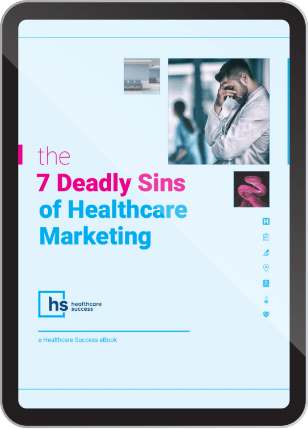How To Know If Your SEO Company Is Ripping You Off
 With increasing frequency we are finding practices and hospitals that are paying for “phantom” Search Engine Optimization services. Call it “Grand Theft SEO.” They’re being charged for the services, but they don’t even have the most basic of SEO techniques in place.
With increasing frequency we are finding practices and hospitals that are paying for “phantom” Search Engine Optimization services. Call it “Grand Theft SEO.” They’re being charged for the services, but they don’t even have the most basic of SEO techniques in place.
Search Engine Optimization is a broad term relating to technical services that the non-technical person can’t always see. It’s part programming, part business experience, and for some observers, part mystical magic. The means and methods of appealing to search engines for ranking and audience awareness can be hard to see.
But here’s a quick way to know if you are being taken advantage of, or if your healthcare SEO company is outright ripping you off.
Use this 7-point self-audit SEO toolbox…
Marketing-smart and highly effective optimization can seem subtle—doing their work in the off-stage world of digital programming, careful word selection and many other techniques. But even if your programming, SEO and technical skills are limited, there are several, easy to check things about a website.
Begin with these self-checking assessment questions:
- Canonicalization: Do your web pages have different or multiple URLs? When individual pages appear to originate from multiple URL addresses (http://www.examplepage.com vs. http://examplepage.com for example) it can be a serious SEO problem. Simply, search engines—most notably Google—might conclude that duplicate content exists. And that’s a Google no-no. Look at the URL source for each site page to assure that you’re not risking a PageRank penalty.
- Duplicate Content: Does your site appear to have identical content? In addition to canonicalization-confusion (above), some sites deliberately or inadvertently duplicate content within the site or with other sites (as in plagiarism). That’s another nasty no-no item. For a quick and easy check, use Copyscape’s free plagiarism checker.
- Responsive Design: Is your website mobile-friendly? Search engines—Google in particular—have declared it essential for a website to use flexible layouts, images and styles that are responsive to the viewer/visitor’s screen size. Do your web pages seamlessly and automatically adjust to big screen, tablet screen or (most importantly) mobile screen? Analyze and discover the answer using Google’s free Mobile-Friendly Test.
- Mobile site speed: Does your site deliver content within seconds? Google says most people will quickly quit your site (and look elsewhere) if pages are too slow to load. Find your desktop speed and your mobile speed via the Test My Site page by Google.
- Blog, blog, blog: Is ongoing blogging present on your website? The simple fact is that websites with a blog get more visibility and about 55 percent more traffic. In SEO terms, a website with fresh and interesting content is more important than pages that never change. What’s more, website visitors stay longer when content holds their attention.
- Count conversions: Is your SEO service more concerned about traffic activity than with bringing in more patients? Your CONTACT page—with name, phone number, etc.—is a vital SEO element. Simple visitor traffic is useful, but building new business depends on actual conversions.
- Google My Business: Have you claimed your unique Google listing? Being found online requires search results visibility. Google My Business is an easy-to-use listing that creates a stronger online presence. It’s free and it’s effective. And if you don’t already have a listing for each business location, visitors aren’t finding you and your SEO firm is definitely asleep at the switch.
The primary purpose of Search Engine Optimization is to enhance your online presence and visibility in ways that appeal to search engines such as Google. SEO methods and techniques must be permissible, or “white hat.” And, ultimately, the objective is to legitimately gain the strongest visibility and highest PageRank in consumer searches.
Admittedly, SEO is challenging. Since Google doesn’t reveal its search algorithm, SEO means and methods are part experience, part science and part careful planning. The seven quick assessment questions above are only the tip of the SEO iceberg, but they are an eye-opening starting point.
If your practice or hospital has been paying for optimization services—and your site doesn’t measure up to these fundamental questions—there’s good reason to believe that your SEO firm is ripping you off. And if you need additional confirmation, or if you’re looking for a reliable and experienced SEO resource, please give us a call today at 800-656-0907. We will test your web presence a dozen additional ways and quickly tell you how to improve online visibility.
See how Healthcare Success transforms doctor marketing by generating exposure and increasing qualified leads!








